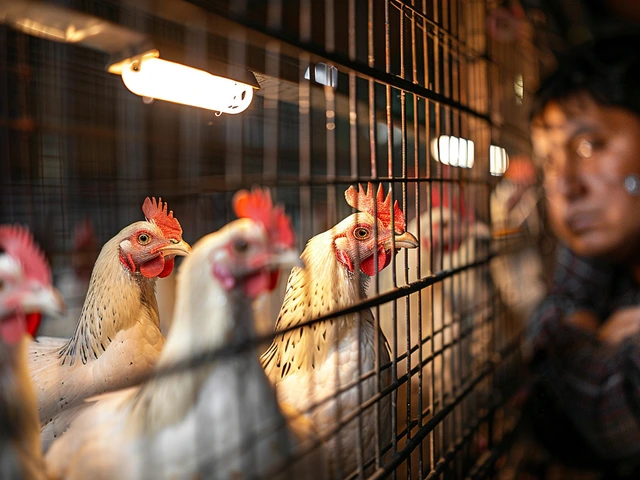World Health Organization Declares Global Health Emergency Over Mpox Outbreak
In a pressing development, the World Health Organization (WHO) has sounded the alarm on a mounting health crisis in Africa by declaring the ongoing mpox outbreak a global health emergency. The designation underscores the severity of the situation, reflecting the highest level of alert possible under international health regulations.
The decision comes in light of a stark and concerning rise in mpox cases across the African continent, most notably in the Democratic Republic of Congo (DRC). As of early 2024, the DRC has reported over 14,000 cases and an alarming 524 deaths. These staggering figures are indicative of the relentless spread of the disease, driven by a newly identified variant known as Clade Ib. This particular strain has proven to be more aggressive and transmissible than its predecessors, capturing the world's attention and prompting swift action.
Clade Ib Variant: A New Threat
The Clade Ib variant has sparked a rapid escalation in mpox cases, extending its reach to four additional African provinces that had previously seen no cases. The virus's capacity to spread quickly and widely has complicated containment efforts, necessitating urgent and coordinated international responses. Furthermore, the outbreak isn't confined to a single country. Neighboring nations such as Burundi, Kenya, Rwanda, and Uganda have reported cases, illustrating the virus's potential to transcend borders effortlessly.
This disturbing spread has compelled the Africa Centers for Disease Control and Prevention (CDC) to declare a continent-wide public health emergency. The urgency of the situation cannot be overstated, as health officials scramble to curtail the virus's trajectory and mitigate its impact.
Modes of Transmission
Mpox predominantly spreads through close contact, which can include sexual contact, making its transmission comparable to other infectious diseases that require physical proximity between individuals. This mode of spread amplifies the challenge of controlling the virus, particularly in densely populated areas or regions with limited healthcare infrastructure.
Global Response and Coordination
In response to the escalating crisis, the WHO has emphasized the imperative need for coordinated international efforts. This encompasses securing necessary funding, organizing robust disease combat initiatives, and promoting extensive community awareness campaigns. The WHO has also expedited the Emergency Use Listing process for mpox vaccines, a critical step towards increasing vaccine accessibility in the most affected regions.
Dr. Tedros Adhanom Ghebreyesus, Director-General of the WHO, has been vocal about the necessity for swift and decisive action. He has called for immediate measures to halt the virus's spread, stressing that the international community must rally together to provide the necessary resources and support.
Current Statistics and Impact
The outbreak's reach spans 13 African nations, with the DRC alone accounting for 96% of the confirmed cases. Such a concentration of cases in one country highlights the dire situation on the ground and serves as a stark reminder of the vulnerabilities faced by nations with already strained healthcare systems. The WHO's declaration aims to enhance collective efforts and galvanize a more aggressive response to this burgeoning health crisis.
Mpox, scientifically known as monkeypox, has historically been considered a less formidable relative of smallpox. However, the emergence of Clade Ib has shifted the narrative, presenting new challenges for containment and treatment. The virus causes fever, rash, and swollen lymph nodes, with complications potentially arising in severe cases. This has led to increased hospitalizations and a burgeoning demand for medical supplies and expertise.
Efforts to Combat the Outbreak
In the face of this unprecedented health emergency, international and national health organizations are mobilizing efforts to curb the spread and provide adequate care to those infected. The WHO's approval of the Emergency Use Listing for mpox vaccines represents a significant advancement in the fight against the disease. Enhanced vaccine access and distribution are critical, particularly in regions with soaring infection rates.
Moreover, public health education initiatives are being ramped up to inform communities about preventive measures. Simple yet effective steps, such as maintaining personal hygiene, practicing safe sex, and avoiding close contact with infected individuals, are being emphasized. These measures, coupled with timely vaccination, could play a pivotal role in mitigating the outbreak's impact.
Role of Governments and Local Authorities
Government bodies in the affected regions are working tirelessly in collaboration with international partners to implement comprehensive response strategies. This includes strengthening surveillance systems to detect and report new cases promptly, ensuring that healthcare facilities are equipped to handle the influx of patients, and providing support to the most vulnerable populations.
The involvement of local communities cannot be understated. Grassroots movements and community leaders are pivotal in disseminating information and rallying their peers to adhere to public health guidelines. Collective action at the local level can significantly bolster efforts to contain the virus's spread and reduce its impact.
The Road Ahead
As the world watches the unfolding crisis, the declaration of a global health emergency serves as a clarion call for enhanced vigilance and increased resources. The battle against the mpox outbreak requires sustained effort, unyielding commitment, and the cooperation of all stakeholders, from international health agencies to local communities.
At its core, this is a battle against time. The quicker the international community can mobilize resources, distribute vaccines, and implement effective containment strategies, the better the chances of curbing the outbreak and preventing further loss of life. While the path ahead is undeniably challenging, the resilience and determination of those on the front lines offer a glimmer of hope. It is through their tireless efforts that the world can aspire to overcome this health emergency and build a more robust framework for future global health security.







Anita Drake
Seeing the virus spread across borders reminds us how interconnected our health is. The communities hardest hit often lack basic sanitation and care, which makes any outbreak exponentially more dangerous. Sharing resources, from vaccines to training, can bridge that gap and protect vulnerable populations. It's also crucial to involve local leaders so health messages resonate culturally. Together we can turn this emergency into an opportunity for stronger health systems.
Eduardo Lopez
The world cannot sit idle while a ruthless pathogen threatens millions. Every delay in funding translates to lost lives, especially in regions already reeling from conflict and poverty. Governments must prioritize transparent procurement of vaccines instead of bureaucratic hedging. The scientific community has already mapped the Clade Ib genome; now we need political will to act on that data. Public health messaging should be clear, not shrouded in fear-mongering that only fuels panic. Communities deserve honest information about transmission routes so they can protect themselves without stigma. International donors should match contributions with rapid deployment logistics, avoiding the red tape that stalls relief. We have the tools-diagnostics, antivirals, and vaccines-yet they sit idle on shelves. Let this be the moment we show moral responsibility on a global scale. Failure to act now will echo in the next generation's health landscape.
Nancy Perez de Lezama
Really, the WHO should have acted sooner.
Matt Heitz
The emergence of Clade Ib represents a paradigm shift in orthopoxvirus epidemiology. Its basic reproduction number (R0) surpasses historical estimates for mpox, indicating heightened transmissibility. Genomic analyses reveal mutations in the viral polymerase that enhance replication fidelity under host immune pressure. Consequently, the pathogen displays a broader tissue tropism, facilitating both mucocutaneous and respiratory dissemination. From a public health logistics standpoint, this necessitates a recalibration of contact tracing algorithms to incorporate aerosol exposure vectors. Moreover, vaccine rollout strategies must transition from ring vaccination to mass immunization campaigns in endemic zones. The current stockpile of JYNNEOS doses, while substantial, is insufficient to meet the surge demand projected by epidemiological models. Scaling production will require activation of technology transfer agreements with manufacturers in the Global South, thereby reducing geopolitical bottlenecks. Fiscal allocations should be earmarked for cold-chain infrastructure, as many affected regions lack reliable refrigeration. Parallelly, health worker training modules need to be updated to address the atypical clinical presentations linked to Clade Ib. Clinical case definitions must incorporate neurologic sequelae, which have surfaced with unprecedented frequency. Surveillance data indicate that nosocomial transmission contributes to up to 12% of new cases, underscoring the need for stringent infection control practices. International regulatory bodies should expedite Emergency Use Authorizations, streamlining the pathway for novel antiviral candidates. Public communication campaigns must eschew stigmatizing language, focusing instead on evidence‑based preventive measures. In summary, a multidisciplinary coalition-combining virology, epidemiology, logistics, and sociocultural expertise-is indispensable to curtail this crisis. Ignoring these imperatives invites not only a prolonged outbreak but also the erosion of global health security.
Susan Mark
That breakdown hits the nail on the head. From a front‑line perspective, the biggest bottleneck I see is the lack of rapid diagnostic kits in remote clinics. When labs can’t confirm cases quickly, isolation protocols fall apart and transmission spikes. Training local health workers on sample collection and biosafety can shave days off the response time. If donors allocate even a modest portion of funds to these kits, we’ll see a noticeable dip in new infections.
Jason Jennings
Honestly, this whole thing feels like a media circus over something we could've handled years ago.
Diego Vargas
The data actually shows that the first Clade Ib case was recorded in late 2022, not this year. The virus's mutation rate is about 1.2 x10^-6 per site per replication, which means it's evolving faster than earlier strains. If we keep ignoring these numbers, we risk underestimating the outbreak's trajectory.
Alex Lee
The vaccines are out, just use them.
Vida Yamini
The fight against Mpox is more than just a medical challenge it is a test of our collective humanity. When a disease spills over from wildlife into communities it reminds us how fragile the balance of nature truly is. The people living in the most affected provinces are already battling poverty and limited access to clean water. Adding a contagious virus to their daily struggle feels like an unfair punishment. Yet in the midst of this darkness there are countless unsung heroes working tirelessly in clinics and community centers. They educate families about safe practices they distribute masks and they comfort those who have lost loved ones. Their dedication proves that compassion can flourish even when resources are scarce. International agencies must listen to these local voices instead of imposing one‑size‑fits‑all solutions. Funding should be directed toward building sustainable health infrastructure not just temporary tents. Training local staff in contact tracing and vaccine administration will leave a lasting legacy beyond this outbreak. Moreover the stigma surrounding the disease can be dismantled by honest conversations that respect cultural norms. When we talk openly about transmission routes we empower people to protect themselves without shame. Remember that the virus does not discriminate but the response often does, so equity must be at the heart of every strategy. The world has the scientific tools, now we need the political will to deploy them swiftly. Let this be a moment where we turn crisis into opportunity for stronger, more resilient health systems. Together we can write a story of hope instead of one of loss.
James Lawyer
The points you raise are well‑substantiated and align with recent WHO technical briefs. From a legal perspective, the International Health Regulations obligate member states to share surveillance data promptly, which remains a hurdle in several regions. Strengthening cross‑border communication protocols could therefore reduce reporting latency. Additionally, integrating community health workers into the formal reporting chain has shown measurable improvements in case detection rates. It would be prudent for donors to allocate a portion of aid to digital reporting platforms to sustain these gains.
Abby Culbertson
i cant believe this is happening again.
Awolumate Muhammed Abayomi
Hey, stay strong! Even when it feels endless your effort makes a huge diff, keep pushing and we'll get through this together.
Josh Tate
Reading about the surge is heartbreaking, especially for families who have already lost so much. The emotional toll on healthcare workers is immense; they juggle fear for themselves and their patients. It's vital that mental health resources be part of the response plan, not an afterthought. Peer support groups and counseling can help prevent burnout. We all share the responsibility to lift each other up during this crisis.
John Smith
Look, the science is crystal clear – the virus's basic reproduction number is above 2, which means without massive vaccination you’ll never flatten the curve. The only reason we’re still seeing spikes is because many countries are still using outdated smallpox vaccine stocks that aren’t effective against Clade Ib. If you want to actually stop it, you need to switch to the newer JYNNEOS formulation and ramp up production immediately. Anything less is just tokenism.
Alex Soete
Absolutely! Let’s channel that energy into concrete actions – organize local vaccine drives, volunteer for community education, and flood social media with accurate facts. When we each take a small step, the ripple effect can turn the tide against Mpox. Keep the momentum going and remember: together we’re unstoppable.